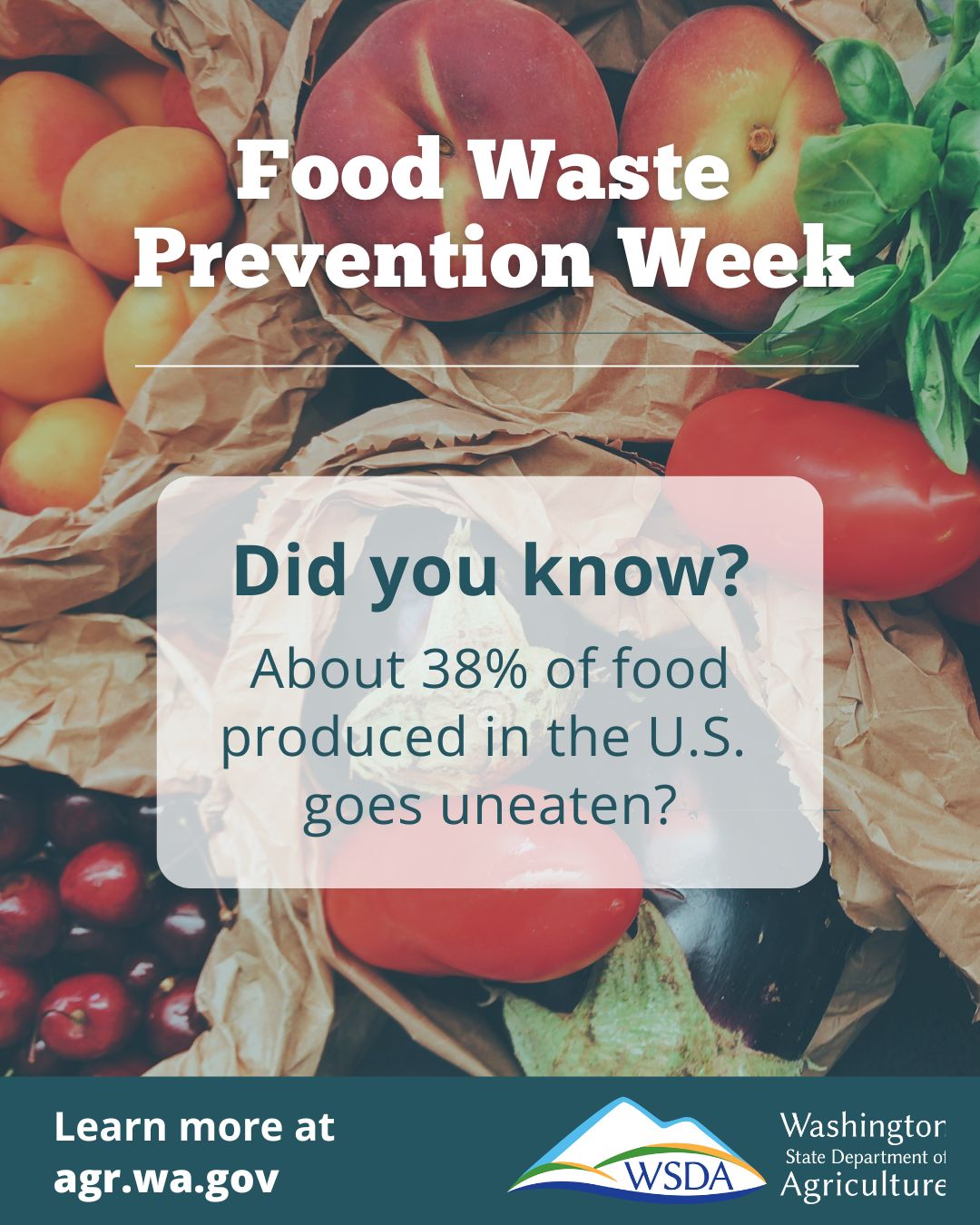Making a difference with food waste prevention
)-(2).jpg?width=400&height=500) Every year, millions of pounds of perfectly good food go to waste in the United States. In fact, Americans lose an average of over $218 billion each year as a result of food being wasted. But food waste doesn’t just affect our wallets, it can also have significant environmental and social consequences. That’s why the Washington State Department of Agriculture is a proud partner of Food Waste Prevention Week, taking place April 7–13, 2025. Since 2020, this annual initiative has gathered more than 600 organizations each year to raise awareness and inspire action to reduce food waste at home, work, and in our communities.
Every year, millions of pounds of perfectly good food go to waste in the United States. In fact, Americans lose an average of over $218 billion each year as a result of food being wasted. But food waste doesn’t just affect our wallets, it can also have significant environmental and social consequences. That’s why the Washington State Department of Agriculture is a proud partner of Food Waste Prevention Week, taking place April 7–13, 2025. Since 2020, this annual initiative has gathered more than 600 organizations each year to raise awareness and inspire action to reduce food waste at home, work, and in our communities.
Food waste prevention offers many opportunities to make a difference
Food waste is a massive issue in the U.S. In fact, up to 38% of all food produced in the country goes uneaten. The impact of this waste extends far beyond individual households:
-
Economic loss: A family of four can save between $1,866 and $3,000 per year simply by reducing food waste.
-
Environmental strain: Wasted food means wasted resources like labor, land, water, and energy. Additionally, food waste in landfills releases methane gas, a major contributor to climate change.
- Food insecurity: Redirecting safe, edible food could help improve food access for those in need, strengthening communities and reducing hunger.
Food Waste Prevention Week aligns with initiatives by USDA, EPA, and FDA to prevent food loss and waste, which aims to cut food waste by 50% by 2030. By working together, we can conserve resources, minimize environmental harm, and build a more resilient food system.
You can help
With Food Waste Prevention Week, it’s easy to do your part! Throughout the week of April 7th, you’ll see social media contests, educational webinars, and in-person events from a variety of local and national organizations.
With a little planning, you can help prevent food waste every day. Follow these tips:
-
Plan your meals: Develop a weekly meal plan to ensure you use all the ingredients you have on hand and avoid impulse purchases.
-
Store food properly: Keep refrigerated foods in covered containers or sealed storage bags, and check leftovers daily to see if they’re still safe to eat.
-
Compost food scraps: Compost food scraps like fruit and vegetable peels, old bread, and coffee grounds to reduce waste and enrich your soil. Many communities in Washington offer composting as part of their waste pick-up service, but, if you have the space, you can also set up a compost system outside your own home.
Visit the U.S. Evnironmental Protection Agency’s website for more ideas on how you can prevent food waste.
Our commitment
WSDA is dedicated to supporting sustainable food systems and reducing waste through the programs in our Focus on Food Initiative. For example, in 2023 WSDA’s Food Assistance Program awarded grants to three Washington organizations Farm to Food Bank grants. These grants were designed to reduce food waste at the agricultural production, processing, and/or distribution levels; build relationships between agricultural producers, processors, and distributors through the donation of food; and to provide food to individuals in need.
“Our food systems are interdependent,” says WSDA Food Policy Advisor Katie Rains. “We recognize the valuable human and natural resources that go into our food and the hard work farmers and food producers, processors, and distributors contribute to Washington's vibrant food community. It takes all of us using our food well to prevent food waste, and our daily actions can make a difference on our household budget as well as our environment.”
